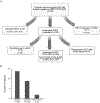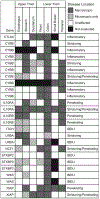Outcomes of Allogeneic Hematopoietic Stem Cell Transplant in Monogenic Inflammatory Bowel Disease
- PMID: 40378986
- PMCID: PMC12464847
- DOI: 10.1016/j.cgh.2025.03.018
Outcomes of Allogeneic Hematopoietic Stem Cell Transplant in Monogenic Inflammatory Bowel Disease
Abstract
Background & aims: Monogenic inflammatory bowel disease (IBD) can result in inborn errors of immunity and intestinal epithelial cell dysfunction, more commonly seen in patients with very early onset IBD (VEO-IBD). Hematopoietic stem cell transplant (HSCT) has emerged as an effective treatment for a subset of patients with monogenic IBD. We sought to evaluate the efficacy and safety of HSCT in these patients. We hypothesized that HSCT will lead to IBD medication-free remission or significant improvement of disease.
Methods: This was a single-center, retrospective study of children with monogenic IBD who underwent HSCT at The Children's Hospital of Philadelphia from 2012 to 2022. The primary outcome was IBD medication-free sustained remission, measured by disease activity index. Secondary outcomes included all-cause mortality, growth, hospitalizations, infections, and HSCT-associated complications.
Results: Thirty-eight patients with monogenic IBD were identified as eligible for HSCT, with 25 undergoing HSCT as therapy for IBD during the study period. There was 100% survival at a median follow-up of 3 years. Prior to transplant, 76% of patients received immunosuppression, and 20% underwent IBD-related surgery. At most recent follow-up, 92% of patients achieved sustained medication-free remission of IBD and 60% with prior ostomy underwent re-anastomosis. There was significant improvement in growth, hospital days, and severe infections.
Conclusions: HSCT resulted in IBD medication-free remission and reduction in disease-associated complications. This highlights the strength of genetic evaluation in patients with VEO-IBD or refractory IBD and consideration of HSCT, which can be curative and lifesaving in patients with monogenic defects involving immune dysfunction.
Keywords: Allogeneic HSCT; Inborn Errors of Immunity; Monogenic IBD; VEO-IBD.
Copyright © 2025 AGA Institute. Published by Elsevier Inc. All rights reserved.
Conflict of interest statement
Conflicts of interest
The authors disclose no conflicts.
Figures




References
-
- Gatti RA, Meuwissen HJ, Allen HD, et al. Immunological reconstitution of sex-linked lymphopenic immunological deficiency. Lancet 1968;2:1366–1369. - PubMed
MeSH terms
Grants and funding
LinkOut - more resources
Full Text Sources

